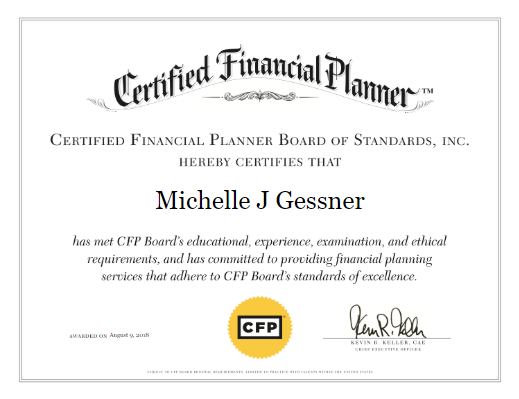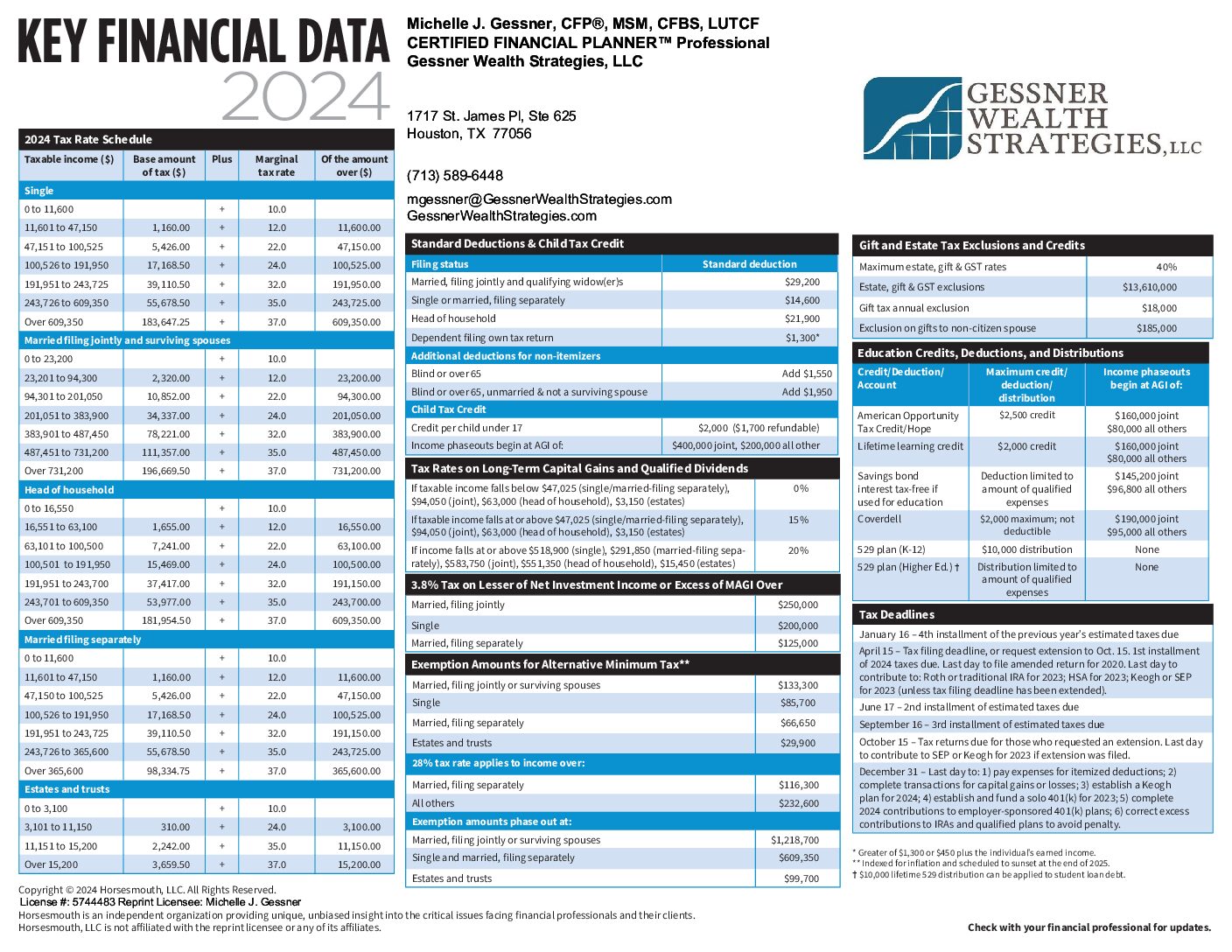One of the most common questions we get from individuals and business owners, as CERTIFIED FINANCIAL PLANNER™ practitioners in Houston is this:
“How do we lower our taxes?”
From business owners to doctors, pilots to entrepreneurs, most people are concerned about paying high taxes. While some states’ taxation laws are much higher than others, everyone still pays their fair share.
That’s why it’s so important to work with a fiduciary financial advisor who has the skills and knowledge to help you navigate how best to leverage your investments and avoid paying large tax bills each year. Having the right tax strategy can result in significant tax savings.
This article covers six effective tax strategies and answers pertinent questions, including:
- What’s the name of an investment that isn’t subject to federal income tax?
- If your employer doesn’t offer a 401(k), how can you save for retirement?
- Why does spreading out charitable donations over time help to decrease taxes?
- How can you use your home office to reduce taxes?
- How can a CERTIFIED FINANCIAL PLANNER™ practitioner in Houston help reduce your taxes?
Did you know Gessner Wealth Strategies provides a no-obligation meeting? Discover more about how we provide financial planning in Houston to busy professionals.
Take Advantage of Tax-Exempt Investments
Depending upon your specific financial situation, it may be appropriate to invest in tax-exempt securities. The income from these investments is free from federal, state, and local taxes.
A tax-exempt security is an investment in which the income produced is free from federal, state, and/or local taxes. Most tax-exempt securities come in the form of municipal bonds, which represent obligations of a state, territory, or municipality.
How a Tax-Exempt Security Works
Income from tax-exempt securities is not subject to federal taxation. With local or state municipal bonds, a state and federal tax exemption is typically allowed on general obligation bonds from your home state. However, this depends upon your location.
Municipal bonds are among the most common types of tax-exempt securities, but mutual funds that invest in municipal bonds and U.S. Savings Bonds can also receive tax-exempt status.
Federal government bonds, such as the U.S. Savings Bond and Treasury Inflation-Protected Securities (TIPS), are also exempt from state and local taxes. If you’re unsure how investing in tax-exempt securities is the right strategy for you, consider reviewing your options with a CFP® professional.
Consider a Roth IRA
Roth IRAs are similar to traditional IRAs, with the biggest difference being how Roths are taxed. Contributions to Roth IRAs are made with after-tax dollars—you can’t deduct them from your taxable income—but you won’t pay any taxes when you start taking withdrawals.
Essentially, a Roth IRA is an Individual Retirement Account that allows you to pay taxes on money going into your account, the money grows tax-free, and then all future withdrawals are tax-free, provided you follow some basic rules.
Pros and Cons of a Roth IRA
No account is a one-stop solution for every investor, and the same is true for Roth IRAs. While there are many advantages to a Roth IRA, it’s crucial to understand the limitations as well.
What are the Three Benefits of a Roth IRA?
- No Forced Minimum Distributions
While a traditional IRA forces you to start taking money from the account at age 72, a Roth IRA has no rule forcing you to take minimum distributions. That means you can leave your Roth IRA to your family if you don’t need to touch it during your retirement.
- Does Not Cause Your Social Security to Be Taxed
Unlike a traditional IRA which triggers taxation on your Social Security benefits because any withdrawals count as income which is then used to determine how much tax you will be assessed on your Social Security benefits, Roth IRAs do not.
- Allows Many Investment Options
The Roth IRA is extremely flexible, allowing you to use it to invest in bonds and stocks. This degree of flexibility works well for times when you want to change up your investment strategy.
What are the Three Limitations of a Roth IRA?
- There’s an Income Limitation for Eligibility
As of 2022, single investors making over $129,000 in modified adjusted gross income (MAGI) are not eligible to make the maximum contribution to a Roth IRA, and investors making over $144,000 are completely phased out.
- The Roth IRA Abides by the Five-Year Rule
There could be a 10% tax penalty for taking a distribution that is considered interest within the first five years of opening your Roth IRA. However, there are situations where this rule is exempt, such as making a down payment on a first-time home purchase, for example.
- If Your Income Increases, You May Become Ineligible to Contribute
Even if the income limitation associated with Roth IRAs doesn’t affect you at first, you may experience a surge in earnings in the future which could cause you to lose the ability to contribute. You would be able to keep the Roth IRA, but you would have no way to add contributions. This is worth considering before opening a Roth IRA.
A Roth IRA may be a feasible option for you, but there are a number of factors to consider first. A professional such as our fiduciary advisor in Houston can help you sort through the details, assess your financial goals, and help you to make a decision on whether a Roth IRA is viable for your portfolio.
Understand Taxes on Dividends
If you are purchasing and investing in individual stocks, it’s important for you to understand how dividends work and if there may be any tax implications that might be passed onto you as a shareholder.
When you own a share of a company’s profits, the portion you own will be distributed to you, typically on a quarterly basis. This share of profits is called a dividend. Some companies pay dividends that are taxed with the more attractive capital gains tax rate, called “qualified” dividends, and other companies pay dividends that are taxed at the higher ordinary income tax rate, called “ordinary” dividends.
How Can You Earn a Tax Credit on Dividends?
You can earn a tax credit for dividends, but only if the investment is held in a retirement account. That means if you own stocks and mutual funds outside of your retirement account, then any dividend payments will be taxed as ordinary income or at the lower capital gains tax rate.
You can deduct dividends from your income if they are paid out by companies you hold in a retirement account, such as an IRA or 401(k). This may seem confusing but note that the right CFP® professional can help ensure that you’re investing in the best opportunities and minimizing taxes.
Know Your Tax Withdrawal Rates
Taxes can be a big drag on your earnings. That’s why it’s critical to either know the tax rules related to your investments or hire a CFP® professional experienced in tax planning who can assist in developing a tax-advantaged investment strategy for you.
Common Example: Taxes on 401(k) Withdrawals
The 401(k) is a popular retirement account in America, but it comes with major consequences for early withdrawals. If you take out money before reaching the age of 59½, you’ll receive a 10% income tax penalty on your tax return from the IRS.
In addition to the tax penalty, there’s a mandatory 20% tax withholding rate associated with a 401(k) that will have to wait until your next tax return to be reconciled and refunded if that is the incorrect tax rate for you. For example, if you turn 50 and decide to withdraw $20,000, you’ll only see about $16,000 of it and then will have a 10% tax penalty to pay at tax time.
If you are over 59 ½ and want to start drawing from your retirement accounts, your financial planner can assist in developing an efficient withdrawal strategy that provides you with the needed income to enjoy your current lifestyle while not having to incur a large tax bill each year.
By simply being aware of the withdrawal rate associated with your chosen investments, you can avoid losing too much of your hard-earned money to taxes.
Make the Most of the Home Office Deduction
Did you know that the deductions for having a home office are not only available for homeowners, but renters as well?
You can deduct the percentage of your home that is used for business from your taxable income. To do this, you must meet the IRS requirements for claiming the home office deduction.
Does Your Home Office Qualify for Tax Benefits?
There are various criteria determining whether you can claim the home office benefit, but the most important qualifier is this: are you self-employed, an independent contractor, or a gig worker? If you get a W-2 from an employer, you don’t qualify.
Assuming you are self-employed, the space in your house must be a separate structure or distinct room within a single structure. The room should be exclusively used for work purposes, so you can’t just claim the living room couch as a home office.
You must also not be provided with an office space elsewhere through your employer. If you simply work at home but have a separate office space elsewhere, you do not qualify to take the home office deduction.
What Can You Deduct from Your Home Office?
For those who qualify for the home office deduction, there are a variety of ways this can save you money on taxes.
First, you can save money on the actual space for a maximum of $1500. Simply determine the square footage of your home office and you can deduct $5 per square foot up to 300 sq ft.
Additionally, utilities, rent, and some types of insurance can be deducted in proportion to how much of your home is occupied by the workspace. Be prepared to keep detailed records and receipts, as taking this deduction can increase the likelihood of being audited.
Spread Out Charitable Donations
Giving to charity is a popular and ever-growing passion for Americans. In 2020, Americans gave $471 billion to charity.
Charitable donations are a great way to decrease the portion of your income that’s taxable. However, it’s crucial to know the timelines, criteria, and laws associated with charitable giving before you donate.
Special advantages are given to people at 70 ½ or older, so that you can take the standard deduction but still reduce your taxable income by the amount of your charitable donation. This allowance is called a Qualified Charitable Donation and is capped at $100,000 per calendar year for individuals who qualify.
Charitable donations can be a gift of cash or property that are made to qualified, non-profit organizations. Your donations can be deducted from your federal tax returns.
As an individual, you can deduct up to 60% of your adjusted gross income annually. Your financial planning professional can assist you in talking through the best course of action for your personal situation based on your tax planning needs. By spreading out your charitable contributions over a strategic period of time, you can ensure that you’re getting the full effect of the corresponding tax deduction while still building a legacy of which you can be proud.
Take the Guesswork Out of Taxes With Gessner Wealth Strategies
Michelle Gessner, CFP® is experienced in financial planning tax strategies in Houston. She can provide answers to your most challenging tax-planning inquiries.
Unless you enjoy learning about and keeping up with tax laws in your spare time, you’ll want to hire a CERTIFIED FINANCIAL PLANNER™ practitioner who specializes in tax planning to help you sort through the details and make the right decisions.
Our highly-experienced team provides fiduciary investment advice in Houston and the rest of the U.S. We can save you time, money, and stress when it comes to making the right moves with your tax planning and investments.
If you have questions about your retirement plan, managing taxes, or what you should invest in during turbulent times, we have a CERTIFIED FINANCIAL PLANNER™ practitioner in Houston who can help you.
See How Much Gessner Wealth Strategies Can Save You on Taxes
Tax planning can be overwhelming and confusing. With a financial advisor, tax strategies can be an easy factor to implement while investing. Remember, you don’t have to take on the challenge of managing your portfolio and financial plan alone.
We’re here to answer any questions or concerns that may arise during your journey towards financial independence. Contact Gessner Wealth Strategies today for a no-pressure, no-obligation meeting to discuss your investment and retirement goals.






